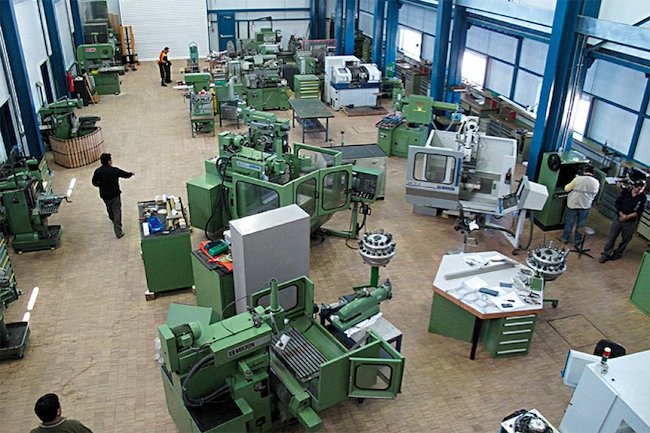The fascinating world of engineering thrives on the practical application of theoretical concepts, and nowhere is this more evident than in a mechanical workshop. This guide explores the fundamental nature of a mechanical workshop, its importance in the broader context of engineering, and how it functions to realize engineering dreams in various sectors.
Key Takeaways
- A mechanical workshop is a crucial hub for manufacturing, maintenance, repair, and research in the engineering field.
- These workshops serve as essential learning platforms, offering hands-on experience in various aspects of mechanical engineering.
- Mechanical workshops play a crucial role in innovation, allowing engineers to create, test, and refine new technologies or methods.
- The effective management of a mechanical workshop involves various factors, including layout optimization, strict adherence to safety regulations, maintenance of equipment, and training of personnel.
What is a Mechanical Workshop?
A mechanical workshop is an environment where engineers, technicians, and mechanics carry out repairs, modifications, or manufacturing of machinery. This setup often features advanced machinery, specialized tools, and professional personnel skilled in various areas of mechanical engineering. It is often used to produce, test, and refine engineering prototypes, models, and complex mechanical systems.
Mechanical workshops provide the following services:
- Manufacturing: These workshops often contain machinery that can fabricate parts from various materials, including metal and plastic.
- Repairs: They serve as repair centers for various mechanical systems and components, from automobile engines to hydraulic systems.
- Maintenance: Routine and preventative maintenance of machinery and systems is another crucial function of mechanical workshops.
- Research & Development: These environments also offer the necessary facilities to conduct experiments, develop new technologies, and refine existing ones.

| Types of Mechanical Workshops | Main Activities |
|---|---|
| Manufacturing workshops | Fabrication of parts |
| Repair and maintenance workshops | Maintenance and repair of machinery |
| R&D workshops | Development of new technologies |
Importance of Mechanical Workshops in Engineering
Mechanical workshops are critical to the field of engineering for a multitude of reasons. Below, we delve into some of the main ways these workshops influence and shape the industry.
Practical Learning and Skill Development
Mechanical workshops provide an invaluable platform for practical learning. Engineers can use the facilities to gain hands-on experience in various aspects of mechanical engineering. Practical skills, such as using machinery, understanding how different systems operate, troubleshooting issues, and implementing solutions, are all honed in the workshop.
Research and Innovation
In addition to practical learning, workshops are the beating heart of engineering research and development. Here, innovative ideas come to life as engineers can create, test, and refine new technologies or methods.
Manufacturing and Production
In the engineering industry, the manufacturing process largely occurs in mechanical workshops. These workshops house the necessary machinery and equipment for creating parts and machinery used across various sectors.
Maintenance and Repair
Without maintenance and repair services offered by workshops, the lifespan of machines and systems would be greatly reduced. Workshops ensure that all machinery operates optimally, reducing downtimes and boosting productivity in various industries.
Key Components of a Mechanical Workshop
Mechanical workshops require a range of key elements to function effectively. Below are the primary components that comprise a successful workshop:
- Machinery and Tools: Depending on the type of workshop, different machinery will be needed. Common machinery includes lathes, milling machines, and drill presses.
- Qualified Personnel: Skilled technicians and engineers are needed to operate machinery, perform repairs, and develop new technologies.
- Safety Measures: Workshops need to prioritize safety, providing appropriate safety gear and training for all staff.
- Efficient Layout: An efficient layout helps in smooth operations, reduces the risk of accidents, and increases productivity.
Implementing and Managing a Mechanical Workshop
To effectively manage a mechanical workshop, a variety of factors must be considered, including the layout, safety regulations, maintenance of equipment, and training of personnel.
In particular, following strict safety regulations and guidelines is essential. These rules, when correctly implemented, can help reduce the risk of accidents and keep employees safe. Additionally, regular maintenance of equipment not only helps prolong the lifespan of machines but also ensures the safety of those using them.
Moreover, the right team is crucial to the operation of a workshop. Training personnel, creating a positive work environment, and keeping the lines of communication open are all ways to ensure an effective and efficient workshop.
In conclusion, a mechanical workshop is an essential part of the engineering industry. It serves as the primary hub for manufacturing, repair, and maintenance activities, and plays a crucial role in research and development. The importance of these workshops in practical learning, skill development, and innovation in the field of engineering cannot be overstated. With the right tools, team, and management, a mechanical workshop can greatly contribute to the advancement of engineering.
Frequently Asked Questions
1. What is the Typical Structure of a Mechanical Workshop?
A mechanical workshop is often organized into specific zones based on the functions carried out. Typically, you will find a machining area where equipment like lathes, milling machines, and drill presses are found. This area is used for fabricating parts or modifying existing ones.
The workshop will also include a welding and cutting area, fitted with equipment for these specific tasks. There is often a separate section for vehicle or machinery repairs, with necessary equipment like hoists, wrenches, and diagnostic tools. Additionally, a mechanical workshop may include a design and planning space equipped with computers for CAD software and similar design tools.
2. What Skills are Required for Working in a Mechanical Workshop?
Working in a mechanical workshop requires a broad set of skills. First and foremost, technical expertise is paramount. This means being proficient with various machinery and tools, understanding mechanical systems, and having a good grasp of engineering principles.
Soft skills are also vital. Good problem-solving abilities can help when troubleshooting issues with machinery or processes. Communication skills are essential for collaborating with colleagues and explaining complex technical issues to non-technical stakeholders. Lastly, attention to detail and safety consciousness are key qualities for preventing accidents and maintaining high standards of work.
3. What Types of Projects are Usually Undertaken in a Mechanical Workshop?
The nature of projects undertaken in a mechanical workshop can vary widely depending on the type of workshop and its specialty. Some workshops focus on manufacturing, where projects involve fabricating parts or building machinery. Others might be dedicated to repair and maintenance, meaning their projects are based around fixing issues with machinery or performing routine service tasks.
Research and development workshops carry out projects that are often innovative, such as developing new technologies or refining existing ones. For instance, they may be working on creating more energy-efficient engines or developing new materials for use in manufacturing.
4. How Do Safety Measures in a Mechanical Workshop Work?
Safety is of utmost importance in a mechanical workshop due to the potentially dangerous machinery and tools in use. Safety measures start with training – workers must be fully trained on how to use machinery correctly and safely. This includes understanding the risks involved and how to mitigate them.
Protective gear such as safety goggles, gloves, and steel-toed boots are also often required. Workshops should also have clearly marked emergency exits and fully stocked first-aid kits easily accessible. Regular safety audits are crucial to ensure safety measures are always up-to-date and effective.
5. How Do Mechanical Workshops Impact the Environment?
Mechanical workshops, like other industrial entities, can have significant environmental impacts. These can result from the consumption of energy and water, production of waste, and potential for pollution from chemicals or waste products.
However, many modern workshops are taking steps to mitigate these impacts. This can include using energy-efficient machinery, recycling waste, implementing proper disposal methods for hazardous materials, and monitoring air and water emissions closely.
6. What is the Future of Mechanical Workshops?
The future of mechanical workshops is likely to be shaped by advancements in technology. Automation, in particular, is expected to play a significant role. Tasks that are currently labor-intensive could become automated, improving efficiency and accuracy.
Other technological advancements, such as 3D printing and virtual reality, could also have an impact. 3D printing may revolutionize the manufacturing process, while virtual reality could be used for training purposes or in design processes. Overall, the future of mechanical workshops is expected to be marked by increased efficiency and innovation.
7. How Do Mechanical Workshops Collaborate with Other Areas of Engineering?
Mechanical workshops often work closely with other areas of engineering. For example, they might collaborate with civil engineers to fabricate structural components, or with electrical engineers to build components for electronic devices.
The collaborative nature of engineering means that workshops can also be interdisciplinary spaces. A project may require input from mechanical, electrical, and software engineers, all working together to achieve a common goal. This interconnectivity enriches the work carried out in mechanical workshops and contributes to the overall advancement of the engineering field.
Conclusion
Understanding the essence of a mechanical workshop and its role in engineering uncovers the backbone of practical application in the industry. These workshops not only serve as the operational heart of engineering projects, but they also provide a fertile ground for learning, innovation, and growth. Through the continuous evolution of mechanical workshops, engineering continues to forge ahead, integrating cutting-edge technology with traditional practices to deliver solutions that shape our world.








